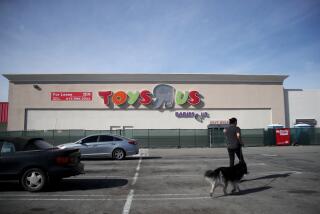Rationalization of Takeover Specialists Is Pure Hogwash
- Share via
I am again amazed by the ongoing rationalization of “junk bond” dealers and takeover artists, such as John Kissick of Drexel Burnham Lambert (Feb. 1, “A Case for Restructuring of Corporate America”), that we should equate the greed of the takeover firms and individuals to the health of corporate America.
If Kissick, T. Boone Pickens Jr., et al would simply be straightforward and honest (even with themselves) and own up to the fact that “greenmail,” unfriendly takeovers and networked arbitrages are simply the latest ways for sophisticated financial people make a killing, no matter what the results, then I would have a lot more respect for these folks. But to rationalize, as they are doing more and more, that takeovers make a firm more effective (i.e. restructuring) is pure hogwash.
First of all, let’s not buy the argument that a takeover is equivalent to restructuring, nor let us assume that restructuring necessarily equates to making the firm more effective. For the most part, restructuring seems to be defined recently as just the laying off a number of employees. This doesn’t necessarily improve the health of the firm or provide anything other than very short-term cost reductions and profit improvement. Random layoffs for the sake of layoffs are simply taking away resources from a firm.
Restructuring, in a positive way, should mean eliminating excess resources from specified areas after a thorough analysis of the strategic direction of the firm. Restructurings should focus on areas that can be promoted versus those that can be scaled down. Such situations, as in the case of USX where there is an obvious excess in steel-making capacity, might be considered an easy restructuring.
In most cases, positive restructuring takes a serious amount of work and thoughtfulness in terms of planning for the future well-being of a firm. Short-term layoffs under the guise of restructuring might be very poor for the long term.
So saying that takeover artists are able to restructure, doesn’t mean much in my book. A takeover is simply a transfer of ownership. To determine if the takeover was good for a firm takes time--time to evaluate if the firm develops better products, if sales and profits are improving for the long term, if the work environment is improving, etc.
Takeovers are not necessarily better or worse than any other form of change in management. We could rationalize that takeovers are good because they “force” cost savings upon a firm that needs it, but didn’t get it from previous management.
Or we could hold the Japanese up as an example and say it is better in the long run to have a few large owners (debt holders) rather than many owners (equity holders).
In this case, it is believed that the debt holders will provide more stability and will look out for the long-term health of the firm, as opposed to the clamoring of equity holders for short-term profits.
On the other hand, we can argue that takeovers are bad because they waste investment capital, require cash flow for paying debts rather than investing in the company’s growth and place significant constraints on new management.
I do think a case can be made, however, for a firm being better off in the hands of management that is interested in the long-term value of the firm.
Takeover artists might prove to be enlightened managers some day and be interested in a firm’s long-term well-being, but I don’t see that at the present. Their interests are to leverage their investment capital as much as possible regardless of other circumstances.
That might have some positive effect aside from making the traders rich, but I haven’t heard any decent arguments in that regard. For now, it is clear to me that the main purpose of the takeover process is to enrich those in the process. And these people should own up to that fact and quit trying to rationalize to the rest of us that their actions are benefiting any one besides themselves.
ERIC J. JOHNSON
Senior Partner, Johnson-Layton Co.
More to Read
Inside the business of entertainment
The Wide Shot brings you news, analysis and insights on everything from streaming wars to production — and what it all means for the future.
You may occasionally receive promotional content from the Los Angeles Times.










